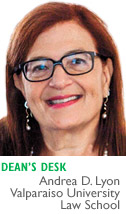Subscriber Benefit
As a subscriber you can listen to articles at work, in the car, or while you work out. Subscribe Now
 Every ethnic group; every age group; rural, suburban and urban residents — these are the people the Legal Services Corp. serves. Established in 1974, the LSC “promotes equal access to justice and provides grants for high-quality civil legal assistance to low-income Americans.” Certainly seems something worthy of continued investment.
Every ethnic group; every age group; rural, suburban and urban residents — these are the people the Legal Services Corp. serves. Established in 1974, the LSC “promotes equal access to justice and provides grants for high-quality civil legal assistance to low-income Americans.” Certainly seems something worthy of continued investment.
Unfortunately, according to several reports, the Trump budget proposal calls for defunding the LSC. Many of us in legal education are dismayed by statements made and actions taken by the Trump administration thus far pushing to eliminate funding to organizations like the LSC that provide civil legal aid to low-income Americans. The current proposal to cut HUD, all funding to Planned Parenthood and other social justice and health-related initiatives presages continued assaults on the all-too-limited resources for the working poor.
LSC assists the poor with basic legal needs in areas like family law, housing, employment, veteran assistance, and natural disaster response. In 2013, LSC helped 1.8 million people — 70 percent of those clients were women trying to keep their children safe and their families together. Providing equal access to justice, LSC is the single largest funder of civil legal aid for low-income Americans in the nation, assisting people who reside in households with annual incomes at or below 125 percent of the federal poverty guidelines (1 in 7 Americans). For these people, the barriers to secure legal aid are often too high, leaving them no place to turn for these vital basic needs.
While LSC has been demonized in various ways over the years as troublemakers or leftist political actors, studies tell us that providing access to basic services produces economic benefits for state and local governments. This research suggests that civil legal aid helps promote individual empowerment and self-reliance, reduces repeat occurrences of domestic violence, helps children leave foster care more quickly, and reduces homelessness by guarding against foreclosures and evictions. In preserving LSC, there is an opportunity for the new administration to work with Congress to maintain support for legal aid and provide equal access to justice for low-income families. “Our nation’s core values are reflected in the LSC’s work in securing housing for veterans, freeing seniors from scams, serving rural areas when others won’t, protecting battered women, helping disaster survivors back to their feet, and many others,” said Linda Klein, president of the American Bar Association.
I have had the opportunity to work with lawyers from LSC, to participate in training with them and to see the dedication and care with which they do their work. At my former institution, one of our clinics worked with LSC on special-education issues. In one case, the clinical professor and her students helped parents find a good placement for their 10-year-old son. He had been labeled a miscreant and a discipline problem, when in fact, he had learning disabilities and some physical challenges. After the case concluded, the professor brought me, her students and the LSC lawyer a drawing that the boy created showing him sitting at a desk with a bright sun shining over his head.
Those of us involved in legal education do what we can both to prepare our students to practice law and to aid in these efforts. We do that with clinical programming, externship programs and by modeling a commitment to pro bono service to our profession. For example, Valparaiso University Law School originally implemented a pro bono graduation requirement of 20 hours in 1988. At the time, it was only one of a handful of schools with a pro bono graduation requirement. In 2009, the faculty increased the pro bono graduation requirement to 40 hours. The requirement was increased again to 60 hours beginning with the Class of 2017. Pro bono opportunities are available for students from the beginning of their first semester, reflecting the mission of Valparaiso University Law School, which embraces law as a calling to leadership and service. Valparaiso University Law School is not alone in encouraging this kind of activity, but we strive to fill gaps in services where we can. Without LSC to fill this “justice gap,” the needs of those without resources would go unmet. Legal clinics simply cannot replace LSC; we can only help support some of the clients that desperately need these services.
We are living in a time where startling news stories like potential Russian interference in our political process are filling the airwaves daily and critical issues like access to basic health care need to be addressed. Given all the issues vying for our attention, it might be easy to overlook a story like the potential defunding of the LSC. Those of us in the legal profession cannot let that happen. Equal access to justice should be considered a basic human right.•
__________
Andrea D. Lyon is dean and professor of law at Valparaiso University Law School. She joined the school in July 2014. The opinions expressed are those of the author.
Please enable JavaScript to view this content.
